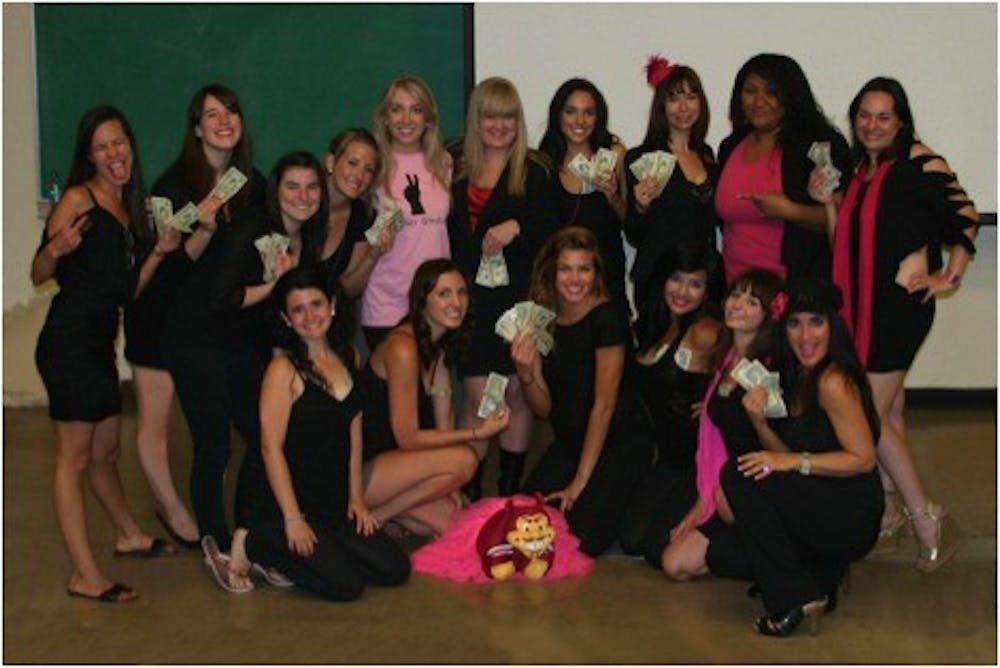Feminism has been good to me. In high school, it gave me the guts to do simple things like question what I was hearing in my Catholic school’s marriage classes and shut down idiots who said women weren’t funny, and in college it’s inspired me to demand the best for myself and others, often by getting involved more seriously in efforts to end violence against women. The Vagina Monologues, Eve Ensler’s groundbreaking first play, is a combination of all of these things. Chances are you’ve heard of it, as it’s performed about 3500 times around the world every year and has given birth to V-Day, a movement to end violence against women and girls globally.
The Vagina Monologues voice all of the thoughts that we’re sometimes too afraid or polite to admit to having, in ways that are brave, honest, heart wrenching, and yes, funny, all at the same time. I loved the play the first time I read it; I’m in awe of the women who make it happen now that I’ve seen it here at ASU. I sat down with director Ashley Smith for what was intended to be a quick Q&A, but because I just couldn’t shut up, it turned into a full-blown conversation. Below is the best of what we said, verbatim. I hope what she had to say inspires you to get involved, even if that starts just by having talks like this of your own.
How did you get involved with the Vagina Monologues?
Seven years ago, I saw a flyer for the Vagina Monologues. I had no idea what it was. At that time I was in a really unhealthy relationship, I was with my abuser, and I was still trying to figure out if I could make things work. It was actually sitting in the audience that I realized that I deserved better, and I wasn’t going to stand for it anymore. The following year was a big year for me, because I almost lost my life to my abuser. I also became a part of the Vagina Monologues. I auditioned, and I got a small part. So, I’ve been here ever since.
That’s what’s great about this play, is that it lets women reclaim power over their lives. That’s so important given the current political rhetoric surrounding vaginas and women’s reproductive health, women’s health in general. It’s obviously really scary, and none of it involves women. So something like this is a great opportunity for women to get involved in the conversation, which, it’s so strange that we have to say that women need to get involved, because women should be the ones having the conversation in the first place.
Absolutely. You know vagina, the word vagina, makes people uncomfortable. Like, “Oh my god, what did you just say?” To me, that’s part of the reason why we’re here -- it’s to de-stigmatize that word, vagina, to make it so that it’s part of our everyday language. What do you want us to call it, if we’re not allowed to talk about our vaginas, what do you want us to say? And we get protestors, people saying that we’re vulgar, but they don’t realize that we have a cause, that we raise money to end violence against women. We’re trying to break that silence and make people uncomfortable, because when you make people uncomfortable, that’s what inspires change.
Exactly. I think it’s great that you see men coming to these things, you see kids coming to these things, because I know some people will be like, “Oh my god a kid was there, that’s so inappropriate,” but what could be less inappropriate than talking about women’s health, women being happy, and women having actual sexual lives? Immediately people want to say that that’s inappropriate, but that’s so strange to me because if I had a kid this is the first place I’d bring them, somewhere that’s progressive, and somewhere that offers a different view of women’s sexuality than what they’re always getting, which is video girls and stuff like that. This is real female sexuality, and not objectification.
Yeah, they see it. They see it in commercials, they see it in music videos, they’re saturated with it. So, why not give them a realistic view of women’s sexuality? It opens their minds, and if we can create a way for them to talk about their “down theres,” whether they’re boys or girls, that helps to reduce abuse. It’s more likely that your children will feel comfortable talking to you. And then if there is peer pressure or something, they’ll be able to reach out because you’ve broken that line and they think, if I can go to this kind of show with you, then I can talk to you about anything.
All of the proceeds from ASU’s production of the Vagina Monologues went to local organization Kaity’s Way and V-Day’s international spotlight campaign for the women and girls of Haiti. Learn about Kaity’s Way, which teaches local teens about dating violence, at their website, and for all things V-Day related go to vday.org.





